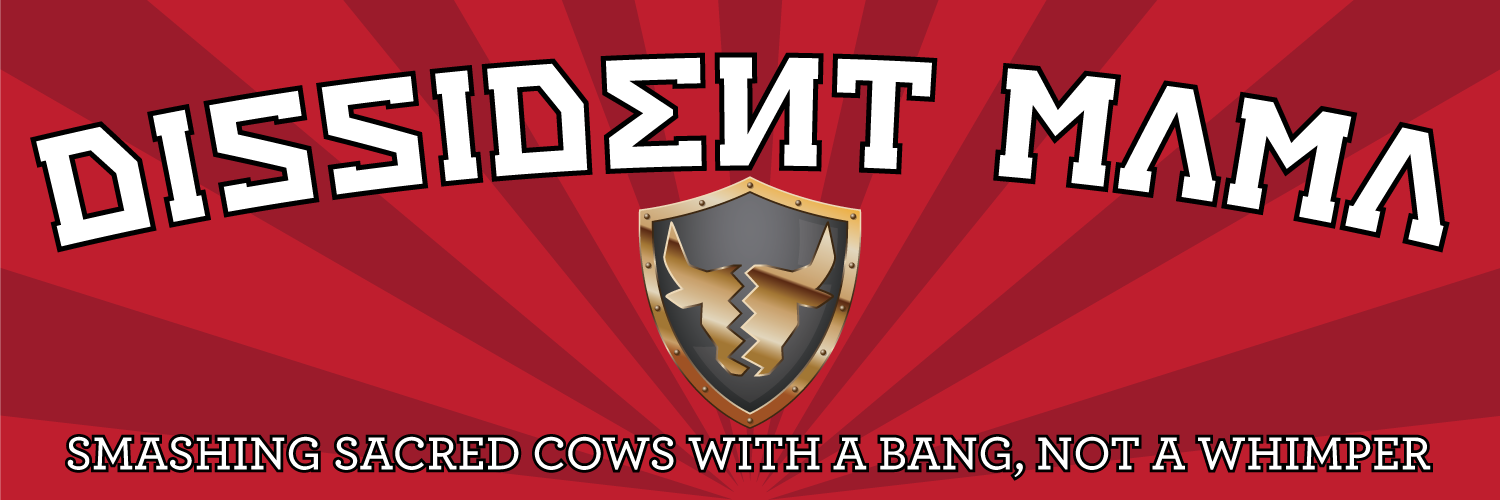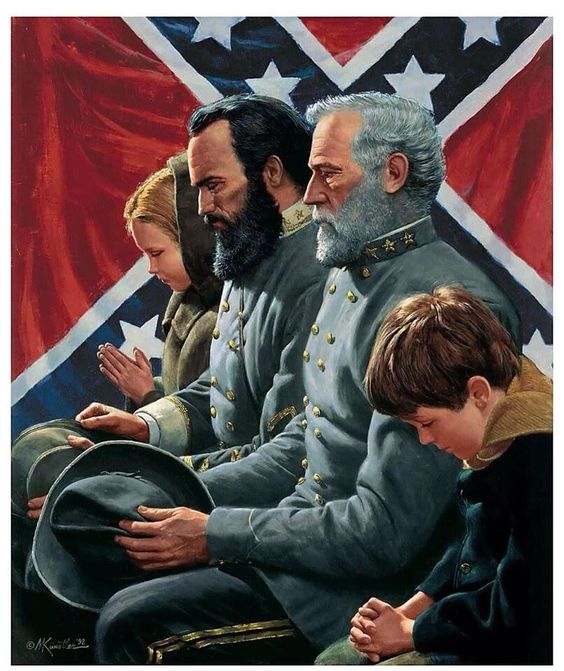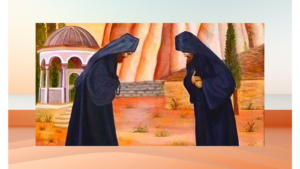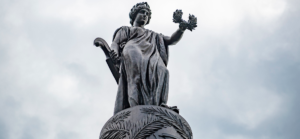“What has given the South her identity are those beliefs and qualities which she has absorbed from the Scriptures and from her own history of defeat and violation: a distrust of the abstract, a sense of human dependence on the grace of God, and a knowledge that evil is not simply a problem to be solved, but a mystery to be endured,” remarked author Flannery O’Connor in “The Catholic Novelist in the Protestant South.”
“Saint Gregory wrote that every time the sacred text describes a fact, it reveals a mystery,” she continued. “And this is what the fiction writer, on his lower level, attempts to do also.”
I’m no fiction writer nor am I Catholic, but I am a journalist and an Orthodox Christian. And I am Southern born and bred just like Ms. O’Connor, so I can relate to O’Connor’s (little-o) orthodox sentiments, on both a cultural and a spiritual level.
She noted, “Whenever I’m asked why Southern writers particularly have a penchant for writing about freaks, I say it is because we are still able to recognize one. To be able to recognize a freak, you have to have some conception of the whole man, and in the South the general conception of man is still, in the main, theological. That is a large statement, and it is dangerous to make it, for almost anything you say about Southern belief can be denied in the next breath with equal propriety.”
“But approaching the subject from the standpoint of the writer, I think it is safe to say that while the South is hardly Christ-centered, it is most certainly Christ-haunted. The Southerner, who isn’t convinced of it, is very much afraid that he may have been formed in the image and likeness of God. Ghosts can be very fierce and instructive. They cast strange shadows, particularly in our literature. In any case, it is when the freak can be sensed as a figure for our essential displacement that he attains some depth in literature.”
Like the fine modern writer Casey Chalk points out, “O’Connor’s literary objective was not to tell the world about all the good, honest people in the South. Her aim was thoroughly practical, while metaphysical: to persuade her readers of their sinfulness and desperate need for divine grace. … Her stories are consequently filled with unadmirable characters meant to stoke our consciences into repentance.”
While “O’Connor’s literature is a labor of love for her native South (and the world), preaching the reality of grace in a land marred by sin, pride, violence,” Chalk adds, today’s Dixie is a place “desperate for something solid and grounded, especially as we rip up and tear down monuments to our once beloved heroes. … Without saints both secular and religious, our catechesis in right living is terribly impoverished.”
We Southerners are so blessed that many of our heroes — like the venerable Lee and Jackson whose birthdays we celebrate this month — weren’t just remarkable generals, fearless soldiers, and humble leaders, but they were also pious Christians. In fact, I think it is the unwavering faith of much of Dixie’s patrimony that is really the main driver of the Southern cultural genocide. All other cultural-Marxist justifications are ancillary.
“Anything that comes out of the South is going to be called grotesque by the Northern reader, unless it is grotesque, in which case it is going to be called realistic,” O’Connor confirmed. And to the rest of dead American society, simply put: the South’s most grotesque feature is our faith.
Thus, it is we devout Dixians who have become today’s freaks precisely because we view man through the theological lens. And there is no love or even empathy for us, for we are traditionalists in a postmodern world, a culture-loving collective stuck in a presentist bad dream, a Jesus people navigating the treacherous seas of a post-Christian dystopia. A thorn in the side of “progress.” Good.
However, due to the reconstructions imposed upon of our forebearers, and those we Southerners and our progeny still face at present, we have become a fragmented and atomized people. It is what writer Walt Garlington calls the “schism in the Southern soul.” Therefore, I offer up a prayer for Dixie’s Land — a “good thing to be stuck with,” as O’Connor would say — so that all the “freaks” will be made whole through loving God.
“For One’s Earthly and Temporal Homeland”
“O Lord Jesus Christ, eternal God, who within time hast become perfect man from the womb of the Virgin: from thy heavenly throne hearken to our prayer for this land. Prepare it for us as a temporal homeland such that we may easily and safely travel therefrom to our true homeland with thee. Give strength to thy people and bless them with peace. As Joseph prospered when he sojourned in Egypt, so prosper the Orthodox Church and her leaders during our sojourn in this land. Adorn our earthly rulers with the faith of Ehud, the hope of Barak, the steadfast trust of Jephthah, the holiness of Samuel, the prudence of Moses, the meekness of David, the wisdom of Solomon, the courage of Hezekiah, the zeal of Josiah, and the nobility of Zerubbabel.
Correct the laws of this land to guide aright men’s deeds and so make their hearts upright, and let us no longer shed innocent blood and be putrid with it, defiling ourselves with the works of darkness. Make our households to be like flocks of sheep, and our children like olive trees around our table. Go forth, O God, with our armed forces, protecting those that serve in them by the power of thy Cross. Grant peace to our cities, towns, and countryside, and by thy mighty right hand and wisdom support and guide the police and all those charged with enforcing the law. Enlighten with the true light of the Gospel the minds of all educators of this land, to whom we commend the instruction of ourselves and our children. Send us rain and sunshine, and also snow and wind from thy storehouses, all in due season. Make our harvests bountiful and multiply them to feed the poor of our land and of the whole world. Make honest the scales of the merchants and bankers, and make the earthly economy of this land ever more to reflect, even as in a mirror darkly, the supernal economy of thy Father. Guide aright the hands of all doctors, nurses, and other healers in this land, and grant that they may employ their arts for the sake of health and life in this world leading unto true life and salvation, and not for the sake of death and the devil.
Have mercy and strengthen our bishops and priests ever to offer prayers at evening, morning, and noonday, and to serve the holy Liturgy in righteousness and purity, so that all who repent and turn to thee may partake of thy Flesh and Blood and so become one Body with thee in thy holy Church. Bless our monasteries and those who dwell there, and multiply in our land them that aspire to the angelic life on earth. Hearken, Lord Jesus, and we shall give thanks to thy holy Name and bless thy wondrous works, proclaiming them with rejoicing. For thou art the Son of the heavenly Father who rulest also the seas and the dry land, and thine is the dominion, together with the same Father and thine All-holy Spirit, our King and Comforter. Sweet is thy mercy, O Lord, from age to age. Amen.”
— Supplication found in “Orthodox Christian Prayers,” St. Tikhon’s Monastery Press, 2019






Comments
At 64, and a late in life convert to Orthodoxy (Antiochian) from cradle evangelicalism, + a based traditionalist, I’m both intrigued with, and encouraged by, the spread of Eastern Orthodoxy in the American south. I’m about as northern as you can get; born in Minnesota, lived in goofy liberal/now leftist “Moscow on the River” Minneapolis, lived in Iowa, and now 34 years in Kansas (not a bad state per se, low unemployment, taxes less than Minnesota, mostly conservative save for leftist Lawrence, decent cost of living, reasonably lax gun laws). I’ve always ascribed to the view that the wrong side won the Civil War, and my admiration and sympathies lie with the south. While I’ve never visited the south, from what I’ve seen and read, it appears to have little difference than the rural Midwest.
While I love my parish, serve as a Subdeacon, and have a family member nearby, I’ve been intrigued with the possibility of further in my old age now relocating to a gun friendly more traditional leaning area in Alabama, Tennessee, or Georgia.
Author
You’re what we Dixians call a Northerner (even though you’re really Midwesterner). But it’s how we classify cool folks from beyond the South vs those horrid foreigners we call Yankees. But you know what’s even worse than a Yankee? A doggone scalawag! Anyway, I’m glad you are a Minnesotan with sense and seemingly good taste. 🙂 And fascinating too that you’re clergy since not all (even those from the South) have much love for their Southern brothers and sisters, like I wrote about here > http://www.dissidentmama.net/love-your-neighbor-as-yourself-except-if-hes-a-dixian/
Stay tough up there in Moscow on the River. And thanks again for commenting!
I wish this bogger well. Although I am traditional Catholic, I recommend (for mature audiences) a book by the Nation of Islam, The Secret Relationship Between Blacks and Jews. It documents the role of Talmudic and Freemasonic slave traders in colonial America. The society they built is not Christian, which is evident from numerous diabolical practices of the slave trade (using helpless black women as “breeders,” for example). However, there are southerners who identify as Christian and fervently wish the old south “to have been Christian.” This comment may make some people angry but it will help explain what you and Flannery O’Connor are talking about.
Author
Thank you for your well wishes, John. While I don’t consider the Nation of Islam a trustworthy source, I get your frustration with how the Talmud and freemasonry have influenced (and still do influence) this thing we call Murica. Your comments don’t make me angry, they simply contradict not only the overwhelming history, papers, and primary soures of Southern culture, but they also don’t jibe with the obvious Christian faith of so many Dixians’ personal letters and diaries.
Two of my great grandfathers fought on the union side. Both men didn’t muster out at the war’s end, but like a lot of soldiers then, they up and hoofed it. One walked home to Iowa, the other walked home to Michigan. Neither men were ever able to get their pensions as a result of record keeping and the fact they split upon their discharges. One was a pious Christian (back in the day when Protestants weren’t so off the rails), the other was a Non-theist. From what I do know, neither men harbored any animus or resentment towards the south, nor the men who fought for the confederacy, and both held many of the confederate generals in high esteem. Both were sickened by the carnage of the battlefields they survived, and both held a strong mistrust and dislike for government henceforth.
Considering the average person on both sides didn’t own slaves, and struggled to make a bare subsistence living then (my great grandfathers were both dirt poor), I’ve never accepted a lick of any legitimacy with this bagging on the south as the scapegoat for every screw up and black mark this sad sack country, and both the Democrats and Republicans have pulled off.
My knee bows first to God, then to the Holy Orthodox Church only. The fact that based and traditionalist Protestant Christians in the south are fed up with the goofy direction evangelicalism is heading, + the sheer evidence of the work of the Holy Spirit, and they’re are fleeing evangelicalism for Orthodoxy, should be a testament to Orthodox Christians elsewhere.
Author
I appreciate you sharing that peek into your fascinating family history, as well as your resistance to the anti-Southern narrative. Sounds like you come from a good stock of critical-thinking folks!
You’re right about traditional Protestants being fed up with evangeleftism. I used to be one of ’em. I pray they come to Orthodoxy, not only because I believe it is the One, True faith, but also because we need all the help we can get rejecting the wokies in our midst. http://www.dissidentmama.net/we-aint-skeered-but-they-are/
Never a dull moment, eh?!
Spot on right, ma’am!
I have little credence for the words coming from these Neo-con young (and not so young) women talking heads like Tomi Lahren 😳, Allie Stuckey, Lauren Southern, yada…yada…
There comes a point where the average old working class stiff like me (and I’m seeing more and more young men inquirers and catechumens like this coming into my Antiochian parish, praise God!) sees how vacuous and dullard “cute” doesn’t equate with credibility, nor integrity.
Pingback: Will America Complete Its Revolution? – Walt Garlington – Kolozeg.Org